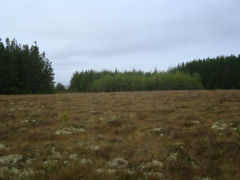Summary
Summary
This PhD studentship project uses peat coring and tree mensuration to assess the effect of afforesting peatlands on the total amount of carbon they store. We measure the amount of carbon below ground in peat, roots and plant litter and estimate the amount above ground in bog vegetation and trees. The findings should improve our understanding of how using peatlands for forestry affects their capacity to limit climate change.
Research objectives
- Use tephra-chronology to quantify the changes in carbon storage within the peat
- Quantify carbon storage in trees to give a complete carbon budget for planted and unplanted areas
- Answer the question ‘Will accumulation of carbon by trees compensate for carbon lost by decomposition of the peat?’
Status
This project started in January 2016 and runs until June 2019. Tom Sloan is the PhD student and is based at the University of York.
Contact
Funders and partners
The project is a partnership between Forest Research, University of York, University of the Highlands and Islands and University of Aberdeen. The project is funded by the Leverhulme Trust, with supervisors’ time funded by the partners.
Forestry Commission policy
Forestry policy relating to peatland habitats was set down in 2000. It encouraged only limited restoration because evidence of benefits was lacking.
In 2014, supplementary guidance for Scotland stated a presumption to restore habitats in protected sites, those affecting connectivity of EU Habitats Directive Annex 1 habitats and those where deforestation would reduce net greenhouse gas emissions. Elsewhere, on sites insufficiently productive for tree growth to compensate for greenhouse gas losses from the soil, it recommends creating low-density, low-intensity, ‘peatland edge woodland’, which retains some woodland benefits but avoids a net carbon loss. ‘Deciding future management options for afforested deep peatland’ gives more information.
Link to University of York project page
General Content
What’s of interest
New book: Peatland Restoration and Ecosystem Services
New project: Creating Sustainable Forested Peatlands
